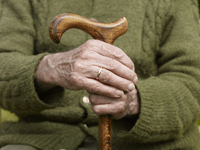
Social care and health services should develop personalised plans to help older people with frailty manage the condition, according to new best practice guidance.
The Fit for Frailty guidance recommends that health and care services routinely assess older people for frailty and develop personalised and interdisciplinary care and support plans to help those with the condition optimise and maintain their health and function.
“Frailty isn’t an inevitable consequence of ageing – it’s a recognisable and treatable condition,” said Dr Gill Turner, vice president of clinical quality at the British Geriatrics Society, which has produced the guidance in conjunction with Age UK and the Royal College of General Practitioners.
“All health and social care professionals should actively look for frailty in the older people they encounter and ensure that appropriate action is taken.
“Failure to recognise frailty in an individual can sometimes mean that quite small changes such as minor infection, a change of drugs or admission to respite care can trigger unexpected serious outcomes such as a sudden and irreversible decline in independence.
“This, in turn, could result in admission to long-term care or even, in the worse case, death.”
The guidance sets out best to identify frailty and recommends that care and support plans for the frail outline treatment goals, management plans and plans for urgent care, including – where appropriate – an end-of-life plan.
It also notes that older people with frailty will often do better at managing their condition in their home if they have appropriate support in place.
“In a stable situation, besides family and friends, most of the care needed by an older person with frailty is delivered by private agency carers,” said Turner.
“Creating personalised care plans with individuals will ensure that all involved in working with that person, including their carers, are involved as part of the team – and that all have their part to play.”
The guidance also recommends that systems are established to share older people’s health record information between health and social services and that social care professionals receive training on frailty.
Caroline Abrahams, charity director at Age UK, added: “At the moment too often older people who are frail and living with multiple conditions end up in a crisis situation with no other choice but to be admitted into hospital or a care home.
“By taking a proactive approach that takes account of the whole person, such a crisis can be prevented and longer-term quality of life improved.”


 Bournemouth, Christchurch and Poole
Bournemouth, Christchurch and Poole  Hampshire County Council
Hampshire County Council  Lincolnshire County Council
Lincolnshire County Council  Norfolk County Council
Norfolk County Council  Northamptonshire Children’s Trust
Northamptonshire Children’s Trust  South Gloucestershire Council
South Gloucestershire Council  Wiltshire Council
Wiltshire Council  Wokingham Borough Council
Wokingham Borough Council  Children and young people with SEND are ‘valued and prioritised’ in Wiltshire, find inspectors
Children and young people with SEND are ‘valued and prioritised’ in Wiltshire, find inspectors  How specialist refugee teams benefit young people and social workers
How specialist refugee teams benefit young people and social workers  Podcast: returning to social work after becoming a first-time parent
Podcast: returning to social work after becoming a first-time parent  Podcast: would you work for an inadequate-rated service?
Podcast: would you work for an inadequate-rated service?  Family help: one local authority’s experience of the model
Family help: one local authority’s experience of the model  Workforce Insights – showcasing a selection of the sector’s top recruiters
Workforce Insights – showcasing a selection of the sector’s top recruiters 

 Facebook
Facebook X
X LinkedIn
LinkedIn Instagram
Instagram
Comments are closed.